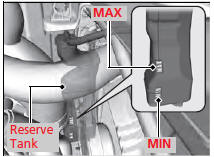Overheating
How to Handle Overheating
Overheating symptoms are as follows:
• The temperature gauge needle is at the
 mark or the engine suddenly
loses power.
• Steam or spray comes out of the engine compartment.
mark or the engine suddenly
loses power.
• Steam or spray comes out of the engine compartment.
First thing to do
1. Immediately park the vehicle in a safe place.
2. Turn off all accessories and turn on the hazard warning lights.
- No steam or spray present: Keep the engine running and open the hood.
- Steam or spray is present: Turn off the engine and wait until it subsides. Then open the hood.
How to Handle Overheating
WARNING
Steam and spray from an overheated engine can seriously scald you. Do not open the hood if steam is coming out.
NOTICE
Continuing to drive with the temperature gauge
needle at the  mark may damage the
engine.
mark may damage the
engine.
Next thing to do

1. Check that the cooling fan is operating and stop the engine once the temperature gauge needle comes down.
- If the cooling fan is not operating, immediately stop the engine.
2. Once the engine has cooled down, inspect the coolant level and check the cooling system components for leaks.
- If the coolant level in the reserve tank is low, add coolant until it reaches the MAX mark.
- If there is no coolant in the reserve tank, check that the radiator is cool. Cover the radiator cap with a heavy cloth and open the cap. If necessary, add coolant up to the base of the filler neck, and put the cap back on.
Last thing to do
Once the engine has cooled sufficiently, restart it and check the temperature gauge. If the temperature gauge needle has gone down, resume driving. If it has not gone down, contact a dealer for repairs.
How to Handle Overheating
WARNING
Removing the radiator cap while the engine is hot can cause the coolant to spray out, seriously scalding you. Always let the engine and radiator cool Reserve down before removing the radiator cap.
If the coolant is leaking, contact a dealer for repairs. Use water as an emergency/temporary measure only. Have a dealer flush the system with proper antifreeze as soon as possible.
See also:
To Create a Security PIN
You can protect each of the six cell phones with a security PIN.
1. Press the PHONE button or the
button.
2. Rotate to select Phone Setup,
then
press .
- Repeat the procedure to sel ...
CD Player
If a disc error occurs, you may see the following error messages.
...
Maintenance Items Under the Hood
2.0 ℓ engine models
2.4 ℓ engine models
...
